Raising Awareness Through Art
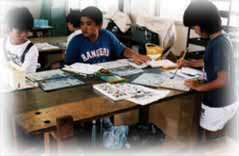 Members of Kids' Eco Club "Peace"
are students in the third grade and up who attend Heiwa (Peace) Elementary School in the city
of Yamato Koriyama, Nara Prefecture. The club was launched in 1996 and has been involved
in a variety of environmental activities under the leadership of "club supporter"
Mihoko Sakai, a teacher at the school.
Members of Kids' Eco Club "Peace"
are students in the third grade and up who attend Heiwa (Peace) Elementary School in the city
of Yamato Koriyama, Nara Prefecture. The club was launched in 1996 and has been involved
in a variety of environmental activities under the leadership of "club supporter"
Mihoko Sakai, a teacher at the school.
For instance, every June club members volunteer to clean up an embankment of the Saho River running near the school. The clean-up operation lasts about two hours, and kids collect about 20 large garbage bags of litter.
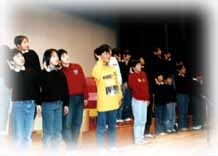 They also perform skits several times a year.
In March 1997, club members performed a play called "Message" at a local community
hall; they also acted it out in April and August.
They also perform skits several times a year.
In March 1997, club members performed a play called "Message" at a local community
hall; they also acted it out in April and August.
In March 1998, 32 club members put on a play titled "Chikyu no himitsu" (Secrets of the Earth) based on a story written by a girl who died of illness in 1991 when she was in sixth grade. Ms. Sakai wrote the script and directed the production.
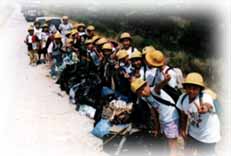 In the play, a boy named Earth tells sixth-grade
boys and girls about our planet’s history, the dangers of pollution, and
the importance of recycling. "We have to stop thinking that 'one little litterbug
like me isn't gonna do much harm,'" Earth argues persuasively. "If we
all think that way, the planet's going to be destroyed in no time. Each one of
us has to find a lifestyle that doesn’t rely on materialistic comforts
or conveniences."
In the play, a boy named Earth tells sixth-grade
boys and girls about our planet’s history, the dangers of pollution, and
the importance of recycling. "We have to stop thinking that 'one little litterbug
like me isn't gonna do much harm,'" Earth argues persuasively. "If we
all think that way, the planet's going to be destroyed in no time. Each one of
us has to find a lifestyle that doesn’t rely on materialistic comforts
or conveniences."
Members of Kids' Eco Club "Peace" also
make drawings on environmental themes. In summer 1997 they jointly produced a
woodblock print titled "Chikyu no ikari" (Earth's Wrath), which won the Kids' Eco
Club Award as the best drawing out of 292 works submitted in an environmental
drawing contest held in December 1997. Measuring 193 centimeters (6 1/3 feet) high
and 125 centimeters (4 feet) wide, the print depicts a tree angry at people for
ruining so much of nature. Around the tree are illustrations of three kinds of
environmental problems humans have caused: air and water pollution, destruction
of forests, and growing heaps of garbage. The print was made by carving a set
of 24 wooden blocks and is framed with empty cans, umbrellas, and other items
discarded at school or at home.
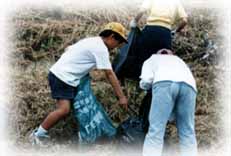 "I was thrilled to receive the award," said Tomoki Sawanoi, who helped create the
drawing. "But I don't think that should be the end of it. I want everyone
on Earth to think more seriously about the global environment."
"I was thrilled to receive the award," said Tomoki Sawanoi, who helped create the
drawing. "But I don't think that should be the end of it. I want everyone
on Earth to think more seriously about the global environment."
"The
drawing was really hard to make," added Natsumi Wada, "but the award
made it all worthwhile. I personally got a gift I'll always treasure from this
experience--a gift called self-confidence."
The club was also one of the top finishers in the 1996 art contest.
"We try
to come up with activities that will get kids to think about how they can protect
what's most important for them and their friends," says the teacher, Ms.
Sakai. The club's guiding principle is to respect the independence of each individual
and to focus on actual experience.
Photos: (From top) Club members work on a project; practicing their lines for a play; posing with trash they picked up; cleaning up the river bank.(Mihoko Sakai)

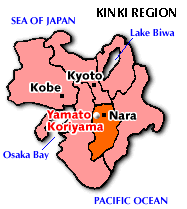
 Members of Kids' Eco Club "Peace"
are students in the third grade and up who attend Heiwa (Peace) Elementary School in the city
of Yamato Koriyama, Nara Prefecture. The club was launched in 1996 and has been involved
in a variety of environmental activities under the leadership of "club supporter"
Mihoko Sakai, a teacher at the school.
Members of Kids' Eco Club "Peace"
are students in the third grade and up who attend Heiwa (Peace) Elementary School in the city
of Yamato Koriyama, Nara Prefecture. The club was launched in 1996 and has been involved
in a variety of environmental activities under the leadership of "club supporter"
Mihoko Sakai, a teacher at the school. They also perform skits several times a year.
In March 1997, club members performed a play called "Message" at a local community
hall; they also acted it out in April and August.
They also perform skits several times a year.
In March 1997, club members performed a play called "Message" at a local community
hall; they also acted it out in April and August. In the play, a boy named Earth tells sixth-grade
boys and girls about our planet’s history, the dangers of pollution, and
the importance of recycling. "We have to stop thinking that 'one little litterbug
like me isn't gonna do much harm,'" Earth argues persuasively. "If we
all think that way, the planet's going to be destroyed in no time. Each one of
us has to find a lifestyle that doesn’t rely on materialistic comforts
or conveniences."
In the play, a boy named Earth tells sixth-grade
boys and girls about our planet’s history, the dangers of pollution, and
the importance of recycling. "We have to stop thinking that 'one little litterbug
like me isn't gonna do much harm,'" Earth argues persuasively. "If we
all think that way, the planet's going to be destroyed in no time. Each one of
us has to find a lifestyle that doesn’t rely on materialistic comforts
or conveniences." "I was thrilled to receive the award," said Tomoki Sawanoi, who helped create the
drawing. "But I don't think that should be the end of it. I want everyone
on Earth to think more seriously about the global environment."
"I was thrilled to receive the award," said Tomoki Sawanoi, who helped create the
drawing. "But I don't think that should be the end of it. I want everyone
on Earth to think more seriously about the global environment."